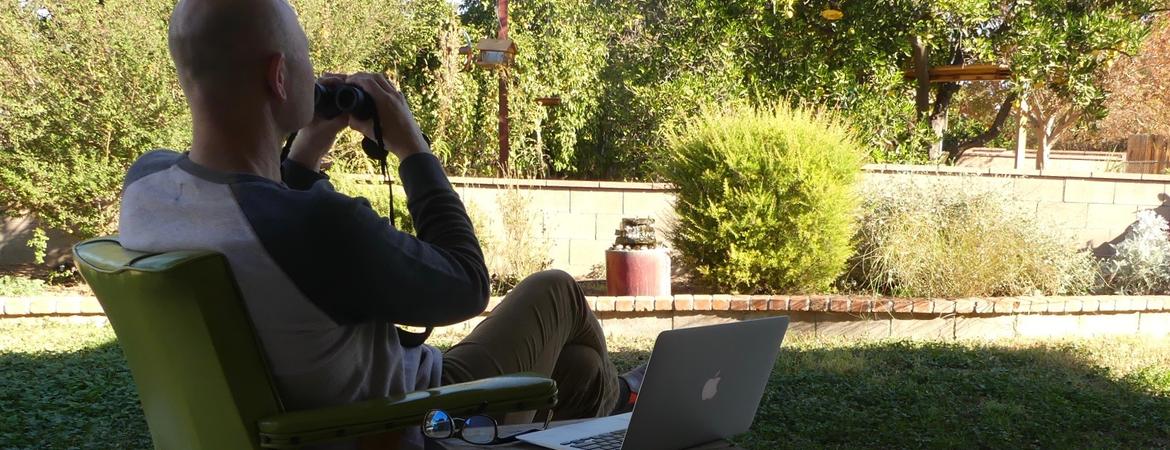College of Humanities, Arts, and Social Sciences

Beginning with campus closure in March 2020, UCR departments and programs have been challenged to find different ways to support students and faculty.
For Bryan Bradford, it's also meant taking on more responsibilities.
“We’ve had to make departmental adjustments due to the pandemic, and Bryan has always been willing to lend a helping hand,” said Erika Leon, HR Business Partner in the CHASS Dean’s Office. “I don’t know what we would do if we ever lost him. He is such a positive team player.”
In addition to his position as coordinator for UCR’S MFA program in Creative Writing and Writing for the Performing Arts, Bradford has served as the graduate coordinator within the Department of Dance, since April 2020.
Despite his busy schedule, Bradford recently made time for an interview to talk about his new role, share advice with students, and talk about his newest personal obsession.
Tell us about your current position/role at UC Riverside.
I’m the graduate coordinator for the MFA program in Creative Writing and Writing for the Performing Arts, which is comprised of two departments: Creative Writing, and Theatre, Film and Digital Production (TFDP). I’ve taken the graduate coordinator role on an interim basis with the Department of Dance.
In addition, I’m the administrative coordinator for TFDP, which means I handle general administrative duties for the department. My graduate coordinator duties are very much the same across the programs, although Dance has a Ph.D. program, and I’ve only worked with the MFA program, so I've had the opportunity to learn about the Ph.D. processes.
My role is more bureaucratic, helping to explain policies and procedures to the students and making sure they’re on track to graduate. I like to think of a graduate coordinator as the Virgil to the students' Dante if Virgil had a program handbook and used the phrase "wet-ink signature" too much.
But I do try to make sure that the students are comfortable in the program and ensure that they’re getting the support they need. I want students to know that we’re all invested in seeing them succeed, and we’ll do what we can to make that happen.
How have you found that the Theater and Dance programs have adapted to switching over to an online platform?
TFDP and Creative Writing have found ways to adjust to remote learning. TFDP had a greater challenge because they had to adapt their productions and filmmaking classes, which are obviously very hands-on. The production staff has done a great job producing the department plays on Zoom, with the student actors performing from their own homes and the crew providing music and sound effects. Our students have generally told me that they’re holding up well, and I hope that’s the case. I’ve encouraged students to check in on each other because I think the therapeutic benefit flows both ways.
Working with multifaceted and creative individuals, do you find that when checking in or meeting with students/faculty/staff, that there is an air of uncertainty across the board, or do you find that everyone is collectively making attempts at staying positive with all the new changes?
I’ve gotten the impression that most of our students and faculty are pulling together and making the best of the circumstances. We all bemoan the situation, but there also seems to be the sense that the act of learning, that doing the work, is a touchstone to normalcy, even if it is occurring in a different format. For my part, I’ve tried to relax my tone in emails and strike a balance between personal and professional so that a part of me is present when I contact people. When someone asks me how I’m doing in an email, rather than saying, “I’m fine,” I might mention how we’re trying to keep my daughter interested in Zoom classes, or how I’m trying to type with our dog’s head resting on my keyboard. I want our students to know that I understand we’re all stuck in this awkward space between our private and professional lives, and I hope to signal that they shouldn’t stress about it when one bleeds into the other. We’re all dealing with similar challenges, and we’ll get through it with a good dose of empathy.
How has it been for you to adjust to working from home?
The adjustment of working from home was difficult because we have a six-year-old daughter who suddenly had to adapt to online learning, and my wife and I found we had become the teacher’s aides. Like so many other people, my family and I are taking up projects we can do from home. We’re currently doing get-out-the-vote work for the Sierra Club, writing letters to voters. We get our six-year-old daughter involved by having her put drawings or stickers on the letters. The most relaxing thing we’ve done is to take up bird watching. I’ve counted as many as 9 different species in our yard at once. I’ll often work on our patio with my computer on my lap and my birding books and binoculars within reach. When 2020 began, I never would have foreseen how often I would be catching myself staring into the distance and thinking about warblers.
“So many of us are working with distractions or limited technology, and it feels as though everything takes longer to do. Extending some grace and patience to everyone – students, faculty, and staff – feels very important right now.”

FEATURED PHOTO. Photos courtesy of Bryan Bradford.
Bird by Bird: Since he started working from home, Bradford has taken up bird watching to relax. "I’ll often work on our patio with my computer on my lap and my birding books and binoculars within reach."